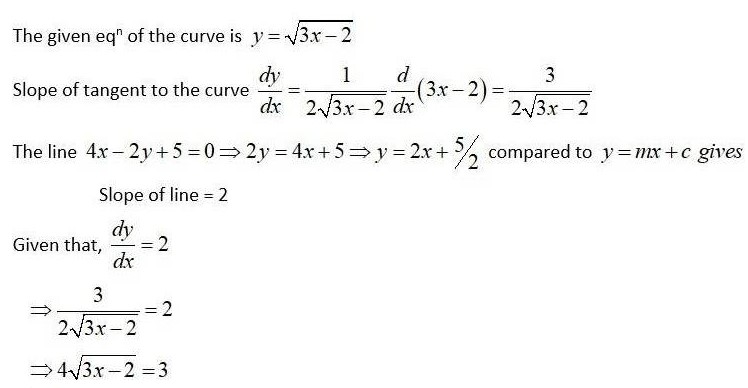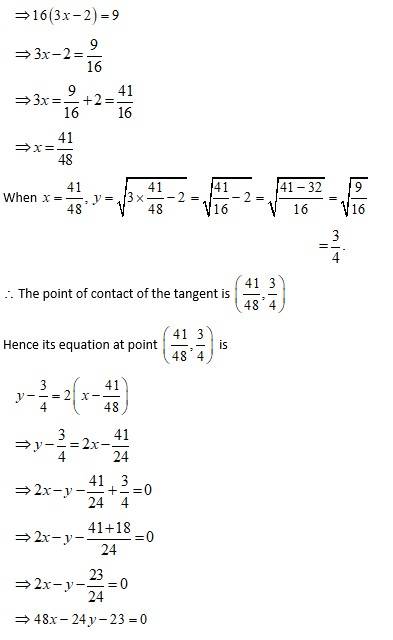Maths
Get insights from 6.5k questions on Maths, answered by students, alumni, and experts. You may also ask and answer any question you like about Maths
Follow Ask QuestionQuestions
Discussions
Active Users
Followers
New answer posted
5 months agoContributor-Level 10
We know that, the surface area 5 of a 'x' when length cube, is S = 6x2.
So,
Given decrease in side,
New answer posted
5 months agoContributor-Level 10
We know that, the volume v of side 'a' mete of cube is v = x3.
So,
Given that, increase in side = 1% of x.
New answer posted
5 months agoContributor-Level 10
Given, y = f (x) = x3- 7x2 + 15.
So,
dy = (3x2- 14x) dx.
Δy = (3x2- 14x) Δx.
Let, x = 5 and Δx = 0.001. Then,
Δy = f (x + Δx) f (x).
f (x + Δx) = f (x) + Δy = f (x) + (3x2- 4x) Δx.
f (5 + 0.001) = 53- 7 (5)2 + 15 + [3 (5)2 - 14 (5)]. (0.001).
f (5.001) = 125 - 175 + 15 + (75 - 70) (0.001)
= -35 + 0.005 = - 34.995.
New answer posted
5 months agoContributor-Level 10
Given, y = f (x) = 4x2 + 5x + 2.
So, f (x) = 8x + 5. = 8x + 5 dy = (8x + 5) dx.
Let x = 2 and Δx = 0.01.Then,
f (x + Δx) = f (2 + 0.01) = f (2.01).
Δy = f. (x + Δx) f (Δx).
f (x +Δx) = f (x) +Δy.
= f (x) + dy = f (x) + (8x + 5) dx.
= f (2.01) = f (2) + (8 x 2 + 5). Δx {∴dx = Δx}
= 4 (2)2 + 5 (2) + 2 + 21 (0.01)
= 16 + 10 + 2 + 0.21 = 28.21.
New answer posted
5 months agoContributor-Level 10
(i) Let y= ?x : Let x = 25 and x = 0. 3.
Then, ?y = ?x+?x
= 5 + dy
=
= 5 + 0.03
(ii) ?49.5
A.(ii)
Let y = ?x Let x = 49 and x = 0.5.
Then,
= 7 + 0.0357.
(iii) ?0.6
A.(iii)
Let y = ?x Let x = 0.64 and ?x = 0.04.
Then,
= 0.8 - 0.025.
= 0.775.
(iv)
A.(iv)
Let Let x = 0.008 and ?x = 0.00 1.
Then, ?y =
= 0.2 + 0.0083.
= 0.208.
(v)
A.(v)
Let Let x = 1 and ?x = -0.001
Then,
= 0.999.
(vi)
A.(vi)
Let Then, x = 16 and ?x = 1.
Then,
(vii)
A.(vii)
Let Let x = 27 and ?x = 1.
Then,
(viii)
A.(viii)
Let Let x = 256 and ?x = 1.
Then,
(ix)
A.(ix)
New answer posted
5 months agoContributor-Level 10
The given eqn of curve is .
Then, differentiating wrt x we get,
which is the slope of the tangent to the curve.
The line compared to gives slope of line = 1.
Since, tangent is the line we have,
Putting y = 2 in we get,
Hence, the required point is
Option (A) is correct.
New answer posted
5 months agoContributor-Level 10
Given,
Slope of tangent,
So, slope of normal
Option (D) is correct.
New answer posted
5 months agoContributor-Level 10
The given eqn of the hyperbola is ______(1)
Differentiating eqn (1) wrt 'x' we get,
is the reqd slope of tangent to the curve
So, eqn of tangent at point is
As lies on the parabola given by eqn (1) we write,
Hence,
New answer posted
5 months agoContributor-Level 10
The given eqn of the curves are
________(1)
and ___________(2)
Differentiating eqn (1) and (2) wrt 'x' we get,
_________(3)
and
_________(4)
Since the two curves cut each other at right angles we get,
________(5)
The point of intersection can be solve from eqn (1) and (2),
Hence, using eqn (5) we get,
Hence proved
Taking an Exam? Selecting a College?
Get authentic answers from experts, students and alumni that you won't find anywhere else
Sign Up on ShikshaOn Shiksha, get access to
- 65k Colleges
- 1.2k Exams
- 679k Reviews
- 1800k Answers


